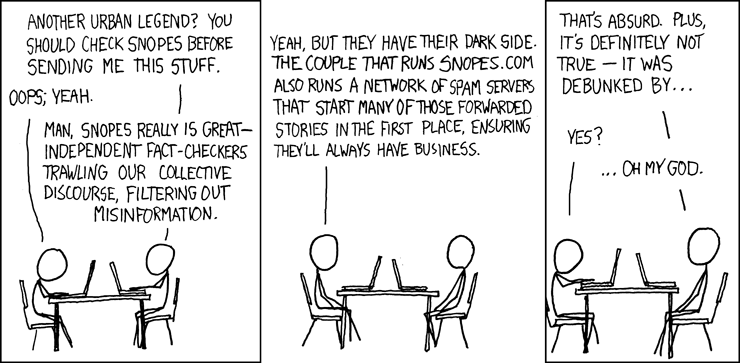
It follows that with the rise of the internet, we’re all publishers. And thus we should be all be our own fact checkers too…
Doesn’t it?
I don’t know. Someone I follow (Stephen Fry) retweeted the following the other day:
[blackbirdpie id=”41454532592402432″]
I read the linked-to article, thought it was interesting, and hit retweet. A friend complained about lack of sources but I was sick and couldn’t be bothered to argue so just took a nap instead. The following morning she tweeted something again about “spreading misinformation”.
This is someone who retweets labour politicians, who (like all politicians?) are known (to me) for having a difficult relationship with the truth. An argument ensued, in which I was likened to a tea partier. A link disputing the the link was provided, I read it, and duly shared it.
[blackbirdpie id=”41873121812287488″]
I share a lot of things on Twitter. Some things are funny, some things are beautiful, some things are interesting. I don’t fact check – especially since, I was retweeting Stephen Fry not Fox news. I don’t see myself as a news source, more as part of a conversation.
Both websites are hideous looking with light text and a dark background. The first one now includes the disclaimer that Jedi are not counted as religious (which is good). Neither is a newspaper, or official government website.
For me the point remains discussing, firstly because just because the governments didn’t do that doesn’t mean they won’t (great article on politicians misusing “evidence” by Ben Goldacre), and secondly because those of us who have no religion should not be ashamed to say so. How far away is saying “it means nothing so I’ll put Jedi” is “it means nothing so I’ll just put Christian”?
Anyway, this has got me thinking about fact checking. If the bar for anything “interesting” must change to “interesting and accurate”, then as I have a day job I’ll have to just stick to funny or beautiful things. If there’s an interesting article summarizing an academic paper, I doubt I’d have the time or inclination to read the paper in discussion and all those cited as supporting evidence. If there’s a political opinion piece I doubt I’d find time to read all opposing opinions and related economic research. I tweet a lot of women in tech stuff – I don’t know what’s right, but I do think we need to keep talking about it. But perhaps I should wait to be absolutely sure of what’s right, and meanwhile it’s better not to say anything at all.
Or perhaps I could just stick to what I’ve been doing. Make no promises about accuracy, I don’t claim to be a journalist, just that I found something interesting and thought others would too. And people can feel free to disagree with me, and hopefully, if they must insult me, come up with something more creative than “tea partier”.
2 replies on “Fact Checking”
I think when you’re encouraging people to change their behaviour – or posting something that may lead to people changing their behaviour/opinions, then you owe it to your followers to either check the facts before you post it or make a disclaimer with the post that you haven’t checked whether it’s true and can’t vouch for the validity, but if it were true it’d be interesting. Of course the source you got it from should matter about whether you trust it or not – I don’t check George Monbiot’s articles because he lists all his sources at the bottom and I trust people who disagree with him to check the sources and publicise if he’s wrong.
Why is this important? It’s important because, as you know, there are malicious agents out there who are deliberately spreading misinformation. People who work for coal and oil lobbies who will say that anthropogenic climate change is a lie. People who work for the government who will say that certain policies are good for the very people they are going to hurt. You say you distrust politicians? By posting things without checking them, you could be playing into their hands.
It is interesting that you think that people are ashamed of stating they have no religion in a census, and would rather put “Jedi” than “no religion”. I’m pretty sure this is not the case for ANYBODY who wrote “Jedi” as their religion in the last census. It was more the fact that people wanted to “hack” the Census and get the British government to declare “Jedi” as a real religion – there was a rumour that if 10,000 people stated they were of the same faith, then that faith would be recognised as an official religion. Of course this rumour was completely unsubstantiated and perhaps people should have checked the source before passing it on…
I don’t think people would put Jedi rather than “no religion”, I’m saying that I don’t agree with anything that encourages an “it doesn’t matter what I put” mentality. So an atheist might but Jedi, but an agnostic who hasn’t been to church since they got ritualistically baptized might put Christian.
I think the standard you outline is a perfectly viable one for how you use twitter. I share a lot more content from a lot more people, and operate on an “until proven wrong” approach rather than a “proven right” approach. I’m also less picky about the native retweet than a custom one, they seem very different to me.
Obviously, this is just how I do things and I don’t think there is one right way to go about it. Many people irritate me with their use of Twitter too. I just don’t think that we can inflict our own standards on them. If we feel that strongly, there’s a button for that – it’s called “unfollow”.